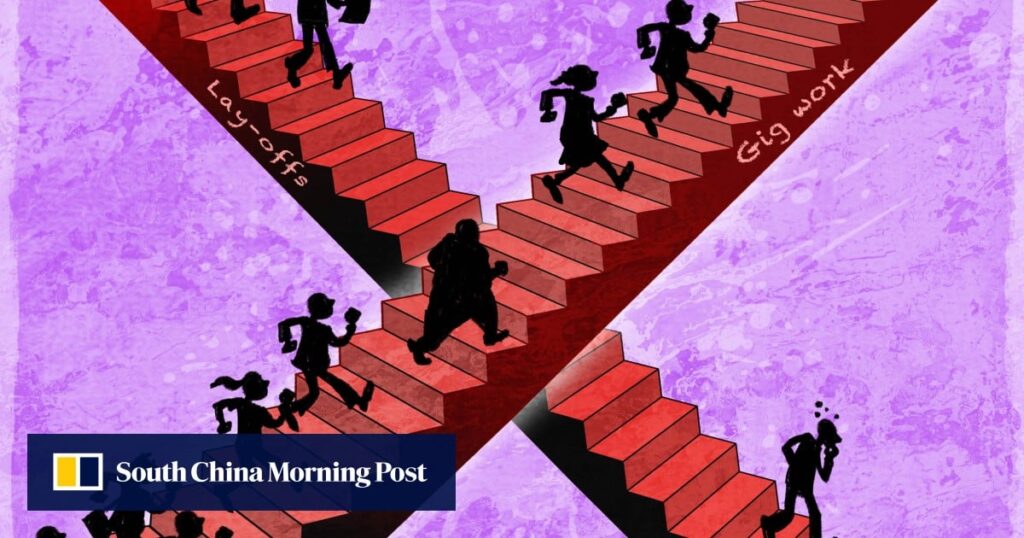China’s Economic Slowdown Sparks Widespread Workforce Reductions
As China’s economy grapples with sluggish growth and declining profit margins, both private and state-owned enterprises are resorting to significant workforce reductions. This trend reflects a broader economic slowdown, marking a stark contrast to the country’s previously rapid expansion.
Economic Context
China’s annual GDP growth is now widely expected to hover around 5% in 2023, a notable decline from the country’s golden decade between 2002 and 2011, when growth never dipped below 9% and often reached double digits. A series of challenges have contributed to this slowdown, including a prolonged property market crisis, increased market competition, and shifting priorities among major industries.
The Property Sector’s Plight
The property sector, once a cornerstone of China’s economic growth, has been severely impacted by a debt crisis and stringent government regulations. Real estate giants are feeling the heat:
- Poly Real Estate, China’s largest developer by market capitalization, reduced its workforce by 16.3%, cutting 11,000 jobs in the past year.
- Greenland Holdings, another major player, decreased its staff by 14.5% to nearly 60,000 employees by the end of 2023.
New government regulations introduced in 2021, aimed at imposing debt limits, have placed immense financial pressure on developers, leading to widespread layoffs despite various rescue packages designed to invigorate the market.
Tech Industry Adjustments
China’s once-booming internet sector is also downsizing due to a focus on profitability amid slowing revenue growth. High-profile companies have announced substantial layoffs:
- Alibaba reduced its workforce by 12.8%, or 20,000 jobs, in the fiscal year 2023, following a 7% cut the previous year.
- Tencent also saw a 2.8% decline in employees, with further reductions in the first quarter of 2024.
Gone are the days of aggressive expansions and ambitious business targets. Today, more internet firms are cutting costs to weather the economic storm. For example, video game developer Perfect World initiated a new round of staff cuts in June after a dramatic 112% plunge in net profits in the first quarter of 2024.
Financial Firms and "Iron Rice Bowl"
In the financial sector, predominantly state-owned companies have opted for reducing compensations and benefits rather than large-scale layoffs. For instance, China International Capital Corporation (CIIC) reduced staff-related costs by 43.4% in the first quarter of 2024.
This conservative approach underscores the enduring appeal of the so-called "iron rice bowl" – a term used to describe secure and stable government jobs that are so desirable they are likened to a "passport to love and marriage."
Automotive Industry Struggles
The electric vehicle (EV) sector is facing a brutal pricing war spurred by fierce domestic competition:
- Li Auto laid off 18% of its employees after an ambitious 62% workforce expansion in 2023.
- Xpeng reduced headcount by 14.4% amid a 10 billion yuan net loss in 2023.
- Nio reported a 25.5% drop in operating expenses, citing decreased personnel costs in its first-quarter report for 2024.
With government EV-purchase subsidies lifted at the end of 2022, manufacturers are navigating a fiercely competitive landscape, leading to significant job cuts.
The Photovoltaic Industry
China’s photovoltaic (PV) industry, notably companies like Longi Green Energy Technology – the world’s largest maker of solar panel materials – is also experiencing cutbacks. Longi announced a 5% workforce reduction after reporting significant losses in consecutive quarters. Despite a surge in PV capacity, increased competition and export curbs from Western countries have pressured profits across the sector.
Looking Ahead
The persistent trend of layoffs and cost reductions could further dampen domestic demand as consumers grow more cautious about spending amidst uncertain income prospects. China is also battling deflationary pressures, with the consumer price index hovering near zero since last April.
Ding Shuang, Chief Economist for Greater China at Standard Chartered, suggests that reviving the economy hinges on creating a fair and supportive investment environment for the private sector. "With enough confidence, investors will use their instincts to discover new promising industries, resulting in new job opportunities," Ding noted.
As China navigates these economic shifts, both the workforce and the broader economy will need to adapt to a new, more measured pace of growth.
